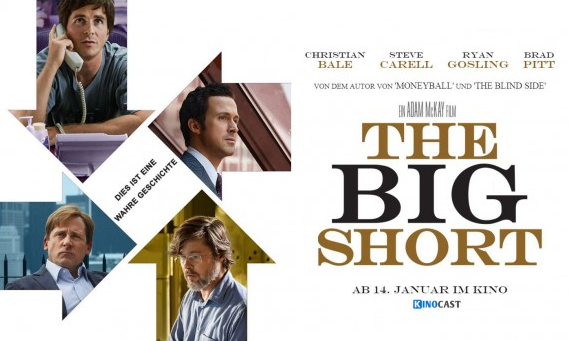Think back to that time not long ago you’ve conveniently put out of your memory. It was from 2005 to 2006, when all the world seemed your oyster, and the threat of economic disaster was as distant to you as Britney Spears’ mental breakdown. This is where The Big Short begins. Directed and co-written by Adam McKay (more widely known for his comedic collaborations with Will Ferrell), the narrative pinpoints a key moment in history: when hedge fund manager Michael Burry (Christian Bale) unearths the very real fact that the housing market is built on an endless series of shady subprime loans. As the president of Scion Capital LLC, he decides to use this information to make a profit for his company and his clients by reinventing the very concept of a credit default swap market, much to the delight of the banks he proposes it to–all too happy to take his money for an idea they’re confident could never possibly pan out.
When trader/narrator of the movie Jared Vennett (Ryan Gosling) catches wind of this, he researches further into Burry’s logic behind such a seemingly “insane” business move, only to find that all of his theories hold weight. After happening to call the wrong number and catching the attention of another hedge fund manager named Michael Baum (Steve Carrell), based on Steve Eisman, Vennett is able to captivate him and his team’s interest long enough to convince them of the impending housing market crisis.
McKay’s tongue-in-cheek, slick ways of explaining the more technical aspects of banking are present from the outset, starting the movie in the 70s, right around the time when the banking game changed from “a fucking snooze,” as Vennett puts it, to one of the biggest boys’ clubs in America–we’re talking The Wolf of Wall Street times a thousand: the strip clubs, the drugs, the houses, the lies. And then, to explain the more boring aspects of the practice, McKay and co-writer Charles Randolph bring in Margot Robbie in a bathtub, Anthony Bourdain in a kitchen and Selena Gomez at a gambling table to better hold our interest. In fact, Vennett makes no bones about how naive we are, clinging to a certain “sound bite” we can repeat about the 2008 financial crisis to ensure we don’t sound as ignorant as we feel regarding the entire affair. The risks McKay and Brad Pitt’s production company, Plan B Entertainment, take with the tone of this film are, indeed, staggering. It’s not every day, after all, that someone tries to make a comedy about something so tragic. Even Pitt’s minimally appearing character, Ben Rickert, is, for all his seriousness, a source of humor throughout–save for when he tells his proteges that their excitement over profiting on the inevitable demise of the American economy is grotesque.
Then, of course, when the proverbial Jenga pieces fall (yes, Jenga is naturally used as a metaphor by Vennett), the prime players in the prediction–Burry and Baum–seem to have not wanted to believe they could actually be right. Worse, the collapse didn’t offer any form of comeuppance or closure, merely a bailout that served to prove criminals in the “white collar” world are given no effective consequences for their behavior. But, one supposes, at least we can laugh to keep from crying about it now–until the next crisis, that is, because none of the behavior has really changed. It’s just been better masked.























[…] red-handed. This is a theme Gosling also appears to be fond of when considering his last film was The Big Short. Except, in the case of The Nice Guys, snappy dialogue is equally as tempered by non-stop action […]
[…] Western/bank robbery movie you didn’t know you needed. As something of a subtle extension of The Big Short, the film addresses the decay still being felt in most small towns across the U.S. in the wake of […]